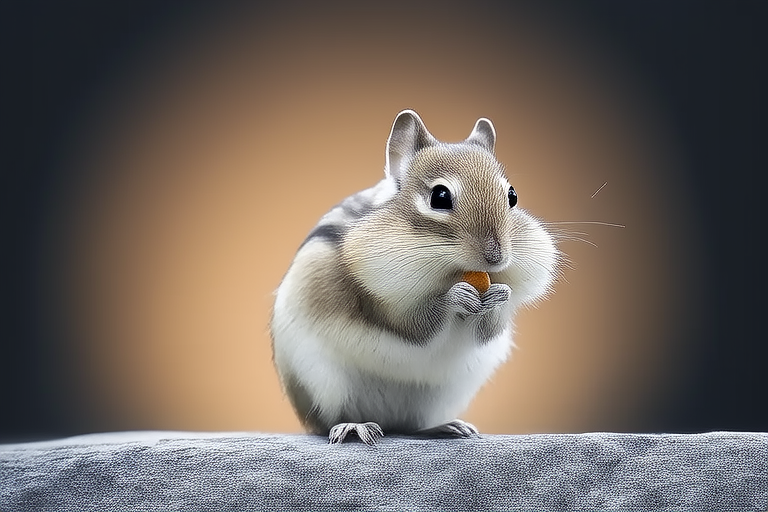Top 10 Myths About Chinchillas Debunked – What Every Pet Owner Should Know
Chinchillas are charming, fluffy rodents that have gained popularity as exotic pets. However, many misconceptions surround these animals, leading to misunderstandings about their care and well-being. This article aims to debunk ten common myths about chinchillas and provide factual information to help current and prospective owners understand these unique pets better.
Myth 1: Chinchillas Only Need Dust Baths
Myth: Many believe that dust baths are the only method for keeping a chinchilla clean.
Factual Explanation: While dust baths are essential for chinchillas, they are not the sole means of cleaning. Chinchillas also require regular brushing to remove loose fur and prevent matting. Additionally, maintaining a clean living environment is crucial. Replace soiled bedding regularly and ensure food and water dishes are cleaned daily. Proper hygiene practices contribute significantly to your chinchilla’s overall health and happiness.
Myth 2: Chinchillas Can Survive on Seeds Alone
Myth: Some people think that chinchillas can thrive on a diet consisting solely of seeds.
Factual Explanation: A diet based on seeds alone can lead to obesity and malnutrition. Chinchillas need a balanced diet rich in hay, pellets formulated specifically for them, and occasional treats like raisins or dried rose hips. Avoid sugary fruits and vegetables, which can cause digestive problems. Providing a variety of foods ensures your chinchilla gets all necessary nutrients, promoting good health and longevity.
Myth 3: Chinchillas Are Low-Maintenance Pets
Myth: There’s a belief that chinchillas are easy to care for due to their small size.
Factual Explanation: Despite their compact size, chinchillas require careful attention to their habitat, diet, and health. Their cages must be large enough to allow exercise and equipped with toys to prevent boredom. Regular veterinary check-ups are necessary, and owners should learn to recognize signs of illness early. Understanding and meeting these needs demonstrates responsible pet ownership and enhances the quality of life for your chinchilla.
Myth 4: Chinchillas Can Live in Cold Climates
Myth: It’s commonly thought that chinchillas can thrive in cold environments.
Factual Explanation: While chinchillas originate from high-altitude regions, they prefer temperatures between 60°F and 70°F (15°C and 21°C). Extreme heat or cold can stress them, leading to health issues. Ensure your home maintains a stable temperature within this range. If you live in an area with fluctuating temperatures, consider using air conditioning or heating to maintain a suitable environment for your chinchilla.
Myth 5: Chinchillas Are Nocturnal Creatures
Myth: Some assume chinchillas are strictly nocturnal.
Factual Explanation: Chinchillas are crepuscular, meaning they are most active during twilight hours—dawn and dusk. They may nap during the day and be more active at night, but this varies among individuals. Understanding your chinchilla’s natural activity patterns helps you anticipate its behavior and adjust your interaction accordingly, fostering a harmonious relationship.
Myth 6: Chinchillas Do Not Require Social Interaction
Myth: There’s a misconception that chinchillas are solitary animals.
Factual Explanation: Chinchillas are social creatures that benefit from interaction with both humans and other chinchillas. While they can live alone, having a companion chinchilla can reduce loneliness and stress. Spend time with your chinchilla daily, offering gentle handling and playtime. This bonding experience enriches their lives and strengthens the bond between you and your pet.
Myth 7: Chinchillas Are Easy to Train
Myth: Some believe that chinchillas are simple to train.
Factual Explanation: Chinchillas are intelligent but have limited capacity for training compared to dogs or parrots. Basic commands like coming when called can be taught, but it requires patience and positive reinforcement. Focus on building trust and providing mental stimulation through toys rather than extensive training. This approach keeps your chinchilla engaged and mentally stimulated.
Myth 8: Chinchillas Are Suitable for Children
Myth: There’s a belief that chinchillas make great pets for children.
Factual Explanation: Chinchillas are delicate animals that may not tolerate rough handling from children. Their sensitive nature makes them more suitable for older, responsible individuals who understand their care requirements. Teach children to handle chinchillas gently and supervise interactions closely. This ensures the safety and well-being of both the child and the chinchilla.
Myth 9: Chinchillas Rarely Get Sick
Myth: Some people think chinchillas are generally healthy and don’t suffer from many illnesses.
Factual Explanation: Like any animal, chinchillas can develop various health issues, including dental problems, respiratory infections, and gastrointestinal disorders. Regular veterinary check-ups and prompt treatment of any symptoms are vital. Being aware of potential health risks allows you to take proactive steps in maintaining your chinchilla’s health. Early detection and intervention can prevent minor issues from becoming serious conditions.
Myth 10: Chinchillas Are Loud and Noisy
Myth: There’s a misconception that chinchillas are noisy pets.
Factual Explanation: Chinchillas are relatively quiet animals. They may make soft chirping sounds or grind their teeth when content or stressed. Their low noise level makes them ideal for apartments or households where peace and quiet are valued. Understanding these vocalizations helps you gauge your chinchilla’s mood and respond appropriately, ensuring its comfort and well-being.
In conclusion, understanding and dispelling these myths about chinchillas is crucial for responsible pet ownership. By providing proper care, attention, and a nurturing environment, you can ensure your chinchilla leads a happy, healthy life. Each aspect of their care—diet, habitat, grooming, social interaction, and health—plays a significant role in their well-being. Embrace the responsibility of owning a chinchilla and enjoy the rewarding companionship these delightful creatures offer.
